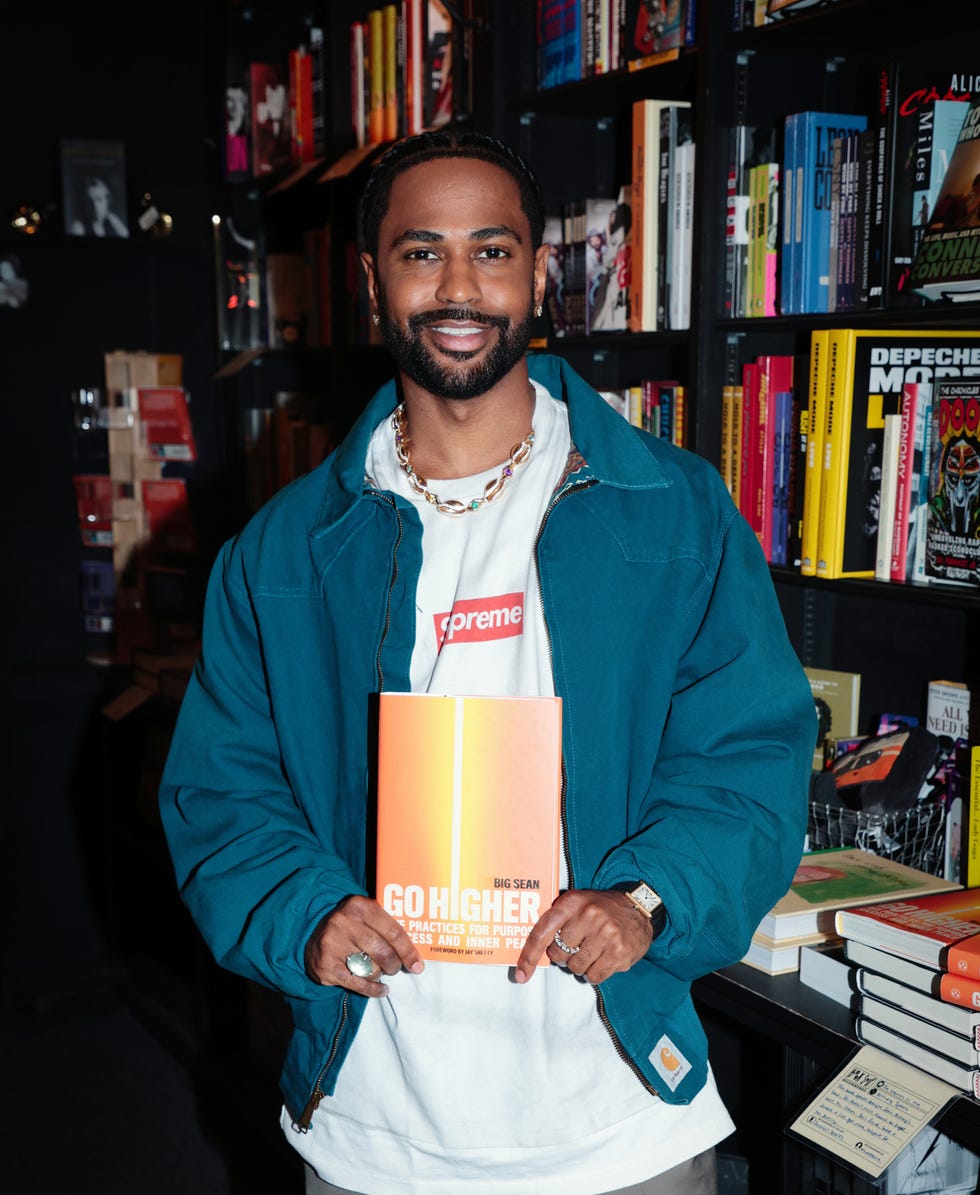SOME SELF-HELP books can often feel like a checklist of your life’s shortcomings. Conversely, others resonate with readers by sharing the author’s personal experiences. This is precisely the goal veteran rapper Big Sean had in mind with his latest book, Go Higher: Five Practices For Purpose, Success, and Inner Peace.
“Sharing your journey can create a more vivid narrative,” Sean explained. “When you’re trying to internalize something, I believe the fastest way to achieve that is to connect with your heart first.”
In his book, Sean recounts his experience with therapy during a pivotal moment in his flourishing rap career, highlighting how he turned to Adderall to numb his emotional pain. This transformative period inspired him to cultivate a holistic wellness routine to aid his recovery. We caught up with the Detroit-born artist to discuss how he reshaped his life for healing and how he translated that journey into both his music and his book.
MEN’S HEALTH: In your book, you discuss your initial encounter with what felt like a depressive episode. When did you realize it was more than just a passing phase?
BIG SEAN: I was anxiously waiting to hear back from Ye about the possibility of signing with his label, and I felt off inside—I just couldn’t pinpoint why. It’s always easier to see things clearly in hindsight. I was still quite young, and that experience was one of my first real challenges. I had invested everything into that opportunity, so I kept telling myself, “I’ll make it work, even if it doesn’t unfold as I envisioned.”
Fortunately, my parents and grandparents were very supportive. My grandmother served as a Black captain in World War II and was a spiritual force, always turning challenges into opportunities. My mother embodies that same resilience. They continually reminded me, “You can manifest this [music career].”
During that time of emotional turmoil, I learned that just because circumstances weren’t favorable didn’t mean I couldn’t choose happiness. Once I shifted my mindset, everything else began to change. I wrote this book for anyone who finds themselves in a similar predicament.
MH: What motivated you to seek help from a therapist?
BS: I believe everyone reaches a developmental crossroads where they feel stuck, and it can be painful. Around ages 29 to 34, life tends to shift drastically. Maybe it’s tied to entering your 30s. You realize you need to reconnect with yourself in a new way. It can be disheartening to face the fact that you’re not the same person you were in your 20s, and that can be frightening when you find yourself thinking, “I don’t even like who I’ve become.”
For many, navigating this alone is challenging. We live in a world filled with others, and we can benefit from their insights and experiences. Sometimes, even a small piece of advice can make a significant difference. [Working with a therapist] has had a profound impact on me, and I encourage everyone to give it a shot if they can. It’s essential to find the right fit, much like searching for a good barber—you may not get the perfect cut right away. But the therapeutic process can be incredibly rewarding and distinct from confiding in family or friends. With a therapist, you can truly unload your burdens and leave them behind.
I even inspired my father to seek therapy. At 75, he grew up during the Civil Rights Movement in Monroe, Louisiana. He faced harsh realities, including physical violence for simply being in the wrong place. Through therapy, he discovered that his stuttering may have stemmed from the traumas he experienced. My point is, even if you think you’re fine, seeking help can only benefit you.
MH: Your openness about your struggle with Adderall addiction is striking. What insights did your recovery provide regarding yourself?
BS: I learned that everyone’s journey is unique. [The addiction] was tearing me apart internally. I know people who rely on it due to prescriptions, but I needed to share my narrative because I was not prescribed it. I’m grateful I recognized that I needed to stop. When addiction takes hold, logic often takes a back seat. I remember walking into my studio one day, realizing I was out of drugs, feeling furious and utterly helpless. That was my wake-up call—I had a problem.
After I quit, it took years for me to rediscover any form of inspiration and joy. I had to invest significant effort into my personal growth. I experienced a profound realization of the importance of being healthy in all aspects: physically, mentally, spiritually, and emotionally. Everything is interconnected. I started exercising, which not only cleared my mind but also improved my mood, cognitive function, and self-esteem.
Additionally, journaling became a powerful tool for me, helping me articulate my thoughts and intentions. I believe in a higher power and the value of maintaining that connection through communication. Meditation, coupled with journaling, provided clarity and helped me begin each day on a positive note.
I strive to integrate these practices into my daily life, adjusting my schedule as needed. For me, consistency is crucial.
In my music, I delve into themes of mental health and self-discovery. Songs like “Black Void” and “ZTFO” capture different facets of my journey. “Black Void” symbolizes growth and rediscovery, while “ZTFO” celebrates self-connection in a fun and liberating manner. Prioritizing self-care is never a waste; it’s essential to carve out time for activities like reading, journaling, and meditation to reconnect with oneself.
Ultimately, it’s about returning to your true self and achieving inner peace. Embracing the journey of self-improvement and discovery should be both enjoyable and rewarding. So, take the time to relax and prioritize your well-being.



